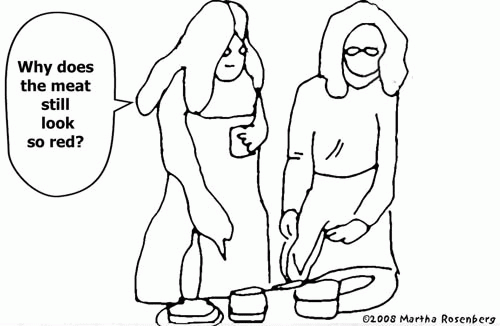Recently the US Department of Agriculture announced
plans to "relax" federal meat and poultry inspections, allowing
meat processors greater leeway in policing themselves, already the agricultural
trend. But most food activists ask how standards could be relaxed any further
when drug residues, heavy metals, cleaning supplies, gasses, nitrites, hormones
and other unwanted guests contaminate the meat supply. They are almost all
unlabeled.
Is seafood safer? Dream on. Mercury-filled
tuna is what inspired Fischer Stevens to make the Oscar-winning documentary
"The Cove," about the Japanese dolphin-fishing industry when he personally
came down with mercury poisoning. The Chicago Tribune , New York Times and Consumer Reports have reported high mercury levels in
almost all red lean and fatty tuna tested, in recent years. Aquaculture is so
festooned with antibiotics, veterinary drugs and pesticides, it can make
factory farming look, well, green. Commercial shrimp production, for example, "begins
with urea, superphosphate, and diesel, then progresses to the use of piscicides
(fish-killing chemicals like chlorine and rotenone), pesticides and antibiotics
(including some that are banned in the US), and ends by treating the shrimp
with sodium tripolyphosphate (a suspected neurotoxicant), Borax, and occasionally
caustic soda," says a review
of Bottomfeeder: How to Eat Ethically in a World of Vanishing
Seafood on AlterNet.
Meat contaminants are not likely to go away because they
stem from Big Meat's desire to maximize profits by growing animals faster,
squeezing them into small living spaces and keeping meat looking
"fresh" on store shelves longer. Here is a list of worst offenders:
Antibiotics
Most people know that antibiotics are part of the diet of US
livestock to make them grow faster (feed is metabolized more efficiently) and
prevent disease outbreaks in cramped conditions. But they'd be surprised at how many animals
destined for the dinner table have drug residues that exceed legal limits. Each week the USDA's
Food Safety and Inspection Service (FSIS) finds dangerous antibiotic levels in
animals which include penicillin, neomycin and "sulfa" and
"cipro" drugs, many from "repeat violators." Excessive
levels are also found of risky antibiotics like tilmicosin, whose
label tells the farmer, "Not for human use. Injection of this drug in
humans has been associated with fatalities," (nice!) and gentamicin,
which the FDA, American Veterinary Medical Association (AVMA) and Association
of Bovine Practitioners warn against using at all, except under rare circumstances. Unlike bacteria which antibiotics are
supposed to kill, "No amount of cooking will destroy [drug] residues"
says a USDA Office of
the Inspector General report.
Bacteria
You'd think with the antibiotic party going on, meat would
be free of bacteria. You'd be wrong. Bacteria are rife in conventionally grown
US meat including antibiotic-resistant bacteria also known as superbugs. Almost
half of beef, chicken, pork and turkey in
samples tested from US grocery stores contained staph bacteria reported
the Los
Angeles Times in 2011--including the
resistant MRSA staph bacterium (methicillin-resistant S. aureus). Pork tested by
Consumer
Reports in 2013 also contained MRSA and
four other kinds of resistant bacteria. Two serious strains of antibiotic
resistant salmonella, called Salmonella Heidelberg and Salmonella Hadar, forced
recent recalls of turkey products from
Jennie-O Turkey and Cargill
and chicken products from Schreiber
Processing Corporation. The resistant salmonella strains were so deadly,
officials warned that disposed meat should be in sealed garbage cans to protect
wild animals. Yes, even wildlife is threatened by the factory farm-created
scourges. MRSA is no longer limited to health care settings, either. Researchers have found it on Florida
public beaches and on the top of unopened soft drink can in a car that was following a poultry
truck.
(Note: You can view every article as one long page if you sign up as an Advocate Member, or higher).






